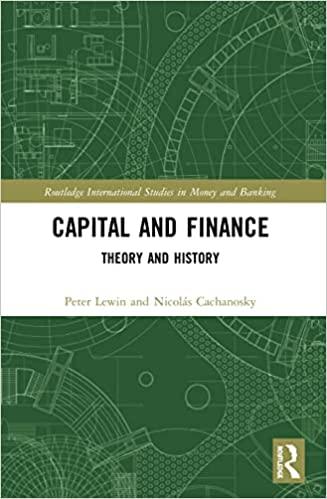Question
Name __ Financial Analysis Exercise IV Part A: Weighted Average Cost of Capital (WACC) Here again is the formula for WACC. For simplicity the term
Name __
Financial Analysis Exercise IV
Part A: Weighted Average Cost of Capital (WACC)
Here again is the formula for WACC. For simplicity the term for preferred stock has been removed:
Go to http://thatswacc.com/[1] and enter the ticker symbol for the stock you selected and click on the tab entitled Calculate WACC.
Complete the following tables:
| Name of Company/Stock | The Boeing Company |
| Ticker Symbol | BA |
|
|
|
From the http://thatswacc.com/ results for your company:
| WACC | 6.60% |
| Cost of debt, iD |
|
| Corporate tax rate, TC |
|
| Total debt, D |
|
| Total equity, E | 78.33% |
| Total firm value, V |
|
| Cost of equity, iE |
|
CAPM Components
| Beta, |
|
| Historical market return, iM | Assumed 11% |
| Risk-free rate, iF | Assumed 3% |
Using data in the table confirm the accuracy of the sites WACC calculation:
| Weight of Equity |
|
|
| Weighted Average Cost of Equity | E
|
|
| Weight of Debt |
| 9.92% |
| Pre-Tax Weighted Average Cost of Debt | D
|
|
| After-Tax Weighted Cost of Debt | D (1- TC)
|
|
| Weighted Average Cost of Capital | = iE + iD (1-Tc)
|
|
Part B: Dividend Payout and Growth Ratios
Recall from Module 1 the following two ratios:
Internal growth rate = (ROA RR) / [1-(ROA RR)] (Eq. 3-30)
where RR = Retention ratio = (Addition to retained earnings)/Net income (Eq. 3-31)
The internal growth rate measures the amount of growth a firm can sustain if it uses only internal financing (retained earnings) to increase assets
Sustainable growth rate = (ROE RR) / [1-(ROE RR)] (Eq. 3-33)
If the firm uses retained earnings to support asset growth, the firms capital structure will change over time, i.e., the share of equity will increase relative to debt
To maintain the same capital structure managers must use both debt and equity financing to support asset growth
The sustainable growth rate measures the amount of growth a firm can achieve using internal equity and maintaining a constant debt ratio
1. For the firm selected for Part A, calculate its internal growth rate for the last fiscal year:
| = (ROA RR) / [1-(ROA RR)] =
|
2. Calculate the firms sustainable growth rate for the last fiscal year:
| = (ROE RR) / [1-(ROE RR)] =
|
Part C.
Consider your results for Parts A and B. If the chosen firm grows at its internal growth rate, increasing assets only with its retained earnings, how will this likely affect its WACC? Show calculations.
|
|
If the chosen firm grows at its sustainable growth rate with increases in both its retained earnings and debt, maintaining a constant debt ratio, how will this affect its WACC?
|
|
If the chosen firm attempts to grow faster than its sustainable growth rate with modest increases in its debt ratio, how will this likely affect its WACC? What about very large increases in its debt ratio? Explain.
|
|
Appendix
Should the Web site http://thatswacc.com/ not be available, please follow the instructions below that have been posted at http://thatswacc.com/faccs.php on how to calculate the terms in WACC.
The components of the WACC equation are calculated using the following financial data:
From the firms balance sheets:
| Period ending | Last Fiscal Year | Last Fiscal Year -1 | Last Fiscal Year -2 |
| Short term debt + Current portion of long term debt (CMLTD) |
|
|
|
| Long Term Debt
|
|
|
|
| Total debt, D |
|
|
|
From the from the firms income statements:
| Period ending | Last Fiscal Year | Last Fiscal Year -1 | Last Fiscal Year -2 |
| Interest expense
|
|
|
|
| Income before tax
|
|
|
|
| Income tax
|
|
|
|
Other data:
| Firms current market capitalization (intraday stock price shares outstanding) | See below. |
| Firms beta, | See below. |
| Return on the market, iM | Assume 11% |
| Risk-free rate, iF | Assume 3% |
The calculations in the table are based on the following:
Total debt, D, is the sum of Short term debt + CMLTD + Long Term Debt
Total equity, E, is the firms current market capitalization = current stock price times the number of shares outstanding. [Should http://thatswacc.com/ not be available, Market capitalization is available on the Summary page at the Yahoo Finance (http://finance.yahoo.com/) site for the stock.]
Total value of the firm, V, equals Total debt, D, + Total equity, E
Cost of debt, iD, = Interest pd in most recent fiscal yr/(Sum of total debt in last two fiscal yrs/2)
iD = Interest expense/Average debt
Corporate tax, Tc, the firms corporate tax rate = Sum of prior three fiscal yrs Income tax expense/ Prior three yrs Income before tax
TC = Average Tax Expense/Average Income Before Tax
Firms cost of equity,
In the table if is assumed to equal 0.03 and iM is assumed to equal 11%. [Should http://thatswacc.com/ not be available, the firms beta, E, is available on the Summary page at the Yahoo Finance (http://finance.yahoo.com/) site for the stock.]
[1] The accessibility of this site is assumed. Should it not be accessible, please follow the instructions in the Appendix at the end of this document.
Step by Step Solution
There are 3 Steps involved in it
Step: 1

Get Instant Access to Expert-Tailored Solutions
See step-by-step solutions with expert insights and AI powered tools for academic success
Step: 2

Step: 3

Ace Your Homework with AI
Get the answers you need in no time with our AI-driven, step-by-step assistance
Get Started


